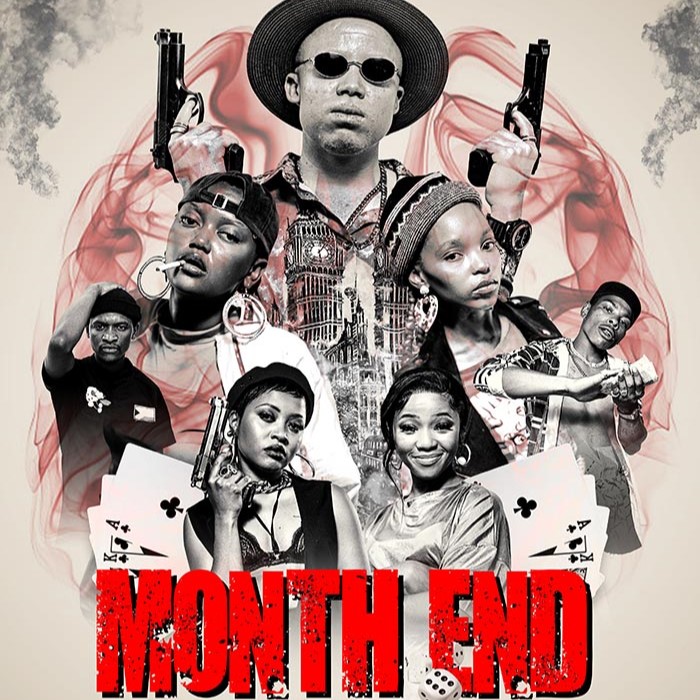A cautionary tale of friends, choices and self-accountability.

“Month End” is an interesting comedy set in a rural township in South Africa, where poverty, vices, and hardships are part of daily life. The story revolves around Lesego, an unemployed young woman in her late 20s, living with her grandmother in their tin house.
The film, written by Shane Maribolla offers a vivid portrayal of township life, capturing its rawness and reality without any glamourization.
The plot kicks off on a Sunday morning at the end of the Month when Lesego‘s grandmother, on her way to church, reminds her that a 55-inch TV, which she had been paying for on layaway, will be delivered to their home. Lesego is instructed to stay at home to receive the delivery and assist with its installation. However, the day takes an unexpected turn when Dollar (played by Tebatso Mashishi), a local loan shark shows up to collect a 1,000 rand debt from Lesego and her close friend Boom Shaka (played by Sibongile Gungu). To show that he means business, Dollar confiscates the newly delivered TV, threatening to sell it by the end of the day if the debt isn’t settled.
The friends must embark on a frantic quest to gather the money. Their quest is filled with humorous and creative attempts to raise the money they need to get the TV set back in time.
Mapula Mafole is a formidably lead with the role as Lesego. She is daring and captures the essence of a slacker with a daring attitude. Lesego’s voice-over narration in English provides an engaging and personal touch to the story, while the rest of the dialogue is in Tswana, adding some authenticity to the delivery of the characters. English subtitles are available, ensuring that non-Tswana speakers can follow the narrative seamlessly.
The film doesn’t just focus on Lesego and Boom Shaka. It introduces other fascinating characters that add depth and humor to the story. Notably, the characters Majinboo and Makhekhe, two dancers add to all the humor and drama that makes up this film. These two have dreams of becoming famous TikTok stars but are hindered by the socio-economic realities of their environment. They work at a roadside car wash and have an eye on everything happening in the community. Their paths cross with Lesego and Boom Shaka in an unexpected and hilarious manner when they decide to rob a local store, just as the ladies are there pretending to be health inspectors on a mission to swindle the shop owner.

Jagiso Samuel Leburu’s direction of the film is noteworthy, presenting an upbeat narrative style reminiscent of typical Hollywood black hood movies. His approach effectively captures the crude living conditions of the township, portraying an unpolished reality that adds to the film’s authenticity. The cinematography complements the choice of location, providing a detailed glimpse into the lives of the township’s residents. A standout sequence in the opening minutes introduces the key characters through an almost flawless long take, simulating a one-take shot that immerses the audience in the setting.
The editing style also keeps the scenes moving and advancing the narrative which helps in situating the core events of this film in the span of one whole day. However, there are a few moments when the timeline feels inconsistent, particularly when characters don’t seem to attach urgency to their situation. This also gets a bit confusing with how fast they are able to move around to and from different locations in the film. But you can argue that this can be overlooked considering that everything is set in a small radius with the locations all in walking distance.
In subtle ways “Month End” touches on several themes such as friendship, greed, and self-accountability. Through Lesego’s choices and experience in the span of an eventful day, we are reminded of the importance of personal responsibility. We are all resposibly for our own choices, even when influenced by external factors.
The film uses its humor-laden story and interesting characters to deliver a strong message that resonates with the audience. Despite the minor confusion in the timeline, the film’s overall impact is significant, leaving viewers with a sense of reflection on personal responsibility and the power of friendship.
I would score this film 7.5/10.

Catch the film at the Durban International Film Festival: https://ccadiff.ukzn.ac.za/diff45/month-end/
Screening Schedule:
20 July 17:00 Gateway 9
26 July 19:30 Suncoast 7
Author: Tony Asankomah
This review emanates from the Talent Press programme, an initiative of Talents Durban in collaboration with the Durban FilmMart Institute and FIPRESCI. The opinions expressed in this article are those of the author (Tony Asankomah) and cannot be considered as constituting an official position of the organisers.

